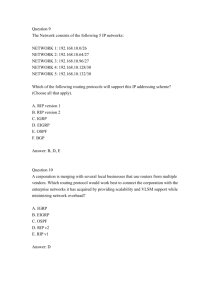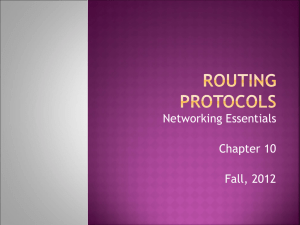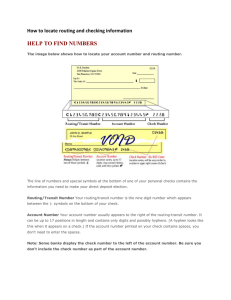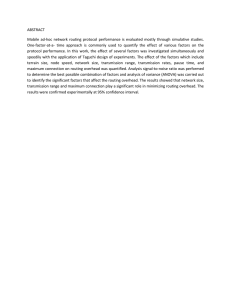SEMESTER 2 Chapter 4 Distance Vector Routing Protocols V 4.0
advertisement
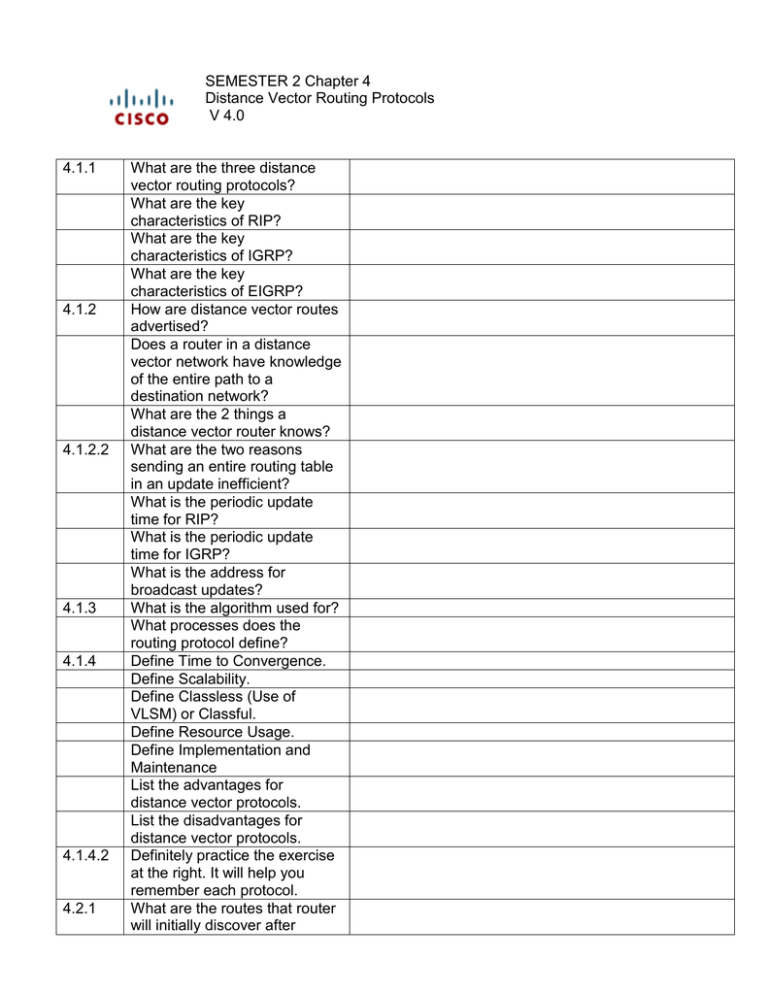
SEMESTER 2 Chapter 4 Distance Vector Routing Protocols V 4.0 4.1.1 4.1.2 4.1.2.2 4.1.3 4.1.4 4.1.4.2 4.2.1 What are the three distance vector routing protocols? What are the key characteristics of RIP? What are the key characteristics of IGRP? What are the key characteristics of EIGRP? How are distance vector routes advertised? Does a router in a distance vector network have knowledge of the entire path to a destination network? What are the 2 things a distance vector router knows? What are the two reasons sending an entire routing table in an update inefficient? What is the periodic update time for RIP? What is the periodic update time for IGRP? What is the address for broadcast updates? What is the algorithm used for? What processes does the routing protocol define? Define Time to Convergence. Define Scalability. Define Classless (Use of VLSM) or Classful. Define Resource Usage. Define Implementation and Maintenance List the advantages for distance vector protocols. List the disadvantages for distance vector protocols. Definitely practice the exercise at the right. It will help you remember each protocol. What are the routes that router will initially discover after 4.2.2.1 4.2.3.1 4.2.4 4.3.1 4.3.1.2 4.3.2 4.3.3 booting? After completing the initial discovery what does the router start to do? What does the initial exchange of routing information contain? What does the router do with the information that is not contained in its routing table? After the first exchange of routing updates what has been added to each routing table? What is convergence? What is slit horizon? The amount of time it takes for a network to converge is directly proportional to ____________________ The speed of achieving convergence consists of what two things? What are the two reasons routers exchange routing updates? What is the period update time for RIP? What are the four reasons listed for topology changes? What are the three additional timers? If an update has not been received to refresh an existing route after 180 seconds, what happens to that route in the routing table? What happens to the route after 240 seconds have elapsed? What does a holddown timer do? What are the two commands that will show the timers? Define bounded update. What are characteristic of EIGRP updates? What is a triggered update? What are the three reasons to send a triggered update? What are the two problems with triggered updates? 4.3.4 4.4.1 4.4.2 4.4.3 4.4.4 4.4.5 4.4.6 4.4.6.2 4.4.7 4.5.1 What is it called when all the routers send updates at the same time on a network with a hub at the center? It this a problem on a switched network? What is a routing loop? What are some reasons for routing loops? What mechanism is built into IP to overcome routing loops? What conditions can be created because of routing loops? What are some of the mechanisms used to avoid routing loops? What is count to infinity? What is infinity defined by? What is infinity for RIP? What is it called when a route goes up, then down, then up etc.? What are holddown timers used for? Describe the process of how a holddown timer works. What is the split horizon rule? What is route poisoning? What is split horizon with poison reverse? What is time-to-live (TTL)? What happens when a packet’s TTL reaches 0? What are the factors that affect the distance vector protocol you choose? What are the features of RIP? What features were introduced with RIPv2? What are the features of EIGRP? What are the advantages of EIGRP?
